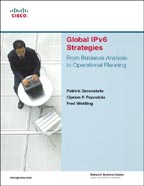
CIPS CONNECTIONS
INTERVIEWS by STEPHEN IBARAKI, FCIPS, I.S.P., MVP, DF/NPA, CNPGlobal IPv6 Strategies from Business Analysis to Operational Planning - a chat with two of the International Experts/Authors: Patrick Grossetete, Fred Wettling, (Ciprian Popoviciu)
This is the next interview in the continuing series of interviews with top-echelon and renowned professionals. I interview two of the authors behind the book, Global IPv6 Strategies from Business Analysis to Operational Planning.  The profiles of these International Experts/Authors are below: Patrick Grossetete, Ciprian Popoviciu, Fred Wettling.
The profiles of these International Experts/Authors are below: Patrick Grossetete, Ciprian Popoviciu, Fred Wettling.
 Patrick Grossetete is the Technical Director at Arch Rock and past manager of product management at Cisco®. While at CISCO, Patrick was responsible for a suite of Cisco IOS® software technologies, including IPv6 and IP Mobility. He is a member of the IPv6 Forum Technical Directorate and in June 2003 he received the IPv6 Forum Internet Pioneer Award. He is a co-author of Deploying IPv6 Networks (Cisco Press, 2006).
Patrick Grossetete is the Technical Director at Arch Rock and past manager of product management at Cisco®. While at CISCO, Patrick was responsible for a suite of Cisco IOS® software technologies, including IPv6 and IP Mobility. He is a member of the IPv6 Forum Technical Directorate and in June 2003 he received the IPv6 Forum Internet Pioneer Award. He is a co-author of Deploying IPv6 Networks (Cisco Press, 2006).
 Ciprian (Chip) Popoviciu, PhD, CCIE, is a Technical Leader at Cisco Systems with over ten years of experience in data and voice over IP communications technologies. As part of Cisco's Network Solution Integration Test Engineering (NSITE) organization, he focuses on the architecture, design and validation of large IPv6 network deployments in direct collaboration with service providers and enterprises worldwide. Ciprian is a regular speaker or chair at conferences and industry events and contributes to various technology publications. He is an active contributor to the IETF standards and he is a Senior member of IEEE and member of several academic advisory boards. Ciprian is co-author of two books: "Deploying IPv6 Networks" and "Global IPv6 Strategies".
Ciprian (Chip) Popoviciu, PhD, CCIE, is a Technical Leader at Cisco Systems with over ten years of experience in data and voice over IP communications technologies. As part of Cisco's Network Solution Integration Test Engineering (NSITE) organization, he focuses on the architecture, design and validation of large IPv6 network deployments in direct collaboration with service providers and enterprises worldwide. Ciprian is a regular speaker or chair at conferences and industry events and contributes to various technology publications. He is an active contributor to the IETF standards and he is a Senior member of IEEE and member of several academic advisory boards. Ciprian is co-author of two books: "Deploying IPv6 Networks" and "Global IPv6 Strategies".
 Fred Wettling manages architecture and planning for Bechtel Corporation, a global leader in engineering, construction, and project management. Fred is one of only 20 Bechtel Fellows-persons designated by Bechtel as leaders in their field of expertise. He is also active within and outside of Bechtel promoting standards-based technology interoperability that supports global enterprise business needs. Network World selected Fred as one of the 50 most powerful people in networking in 2003, 2004, 2005 and 2006. He is a member of the IEEE, North American IPv6 Task Force, and IPv6 Forum, and chaired the Network Applications Consortium for 5 years. He is a member of several industry Technical Advisory Boards and served on the president's National Security Telecommunications Advisory Committee. He has spoken at many conferences and is a co-author of the new book "Global IPv6 Strategies". Fred is a motorcycle enthusiast who regularly enjoys scenic southeastern US back road mountains and valleys.
Fred Wettling manages architecture and planning for Bechtel Corporation, a global leader in engineering, construction, and project management. Fred is one of only 20 Bechtel Fellows-persons designated by Bechtel as leaders in their field of expertise. He is also active within and outside of Bechtel promoting standards-based technology interoperability that supports global enterprise business needs. Network World selected Fred as one of the 50 most powerful people in networking in 2003, 2004, 2005 and 2006. He is a member of the IEEE, North American IPv6 Task Force, and IPv6 Forum, and chaired the Network Applications Consortium for 5 years. He is a member of several industry Technical Advisory Boards and served on the president's National Security Telecommunications Advisory Committee. He has spoken at many conferences and is a co-author of the new book "Global IPv6 Strategies". Fred is a motorcycle enthusiast who regularly enjoys scenic southeastern US back road mountains and valleys.
To listen to the interview, click on this MP3 file link
The latest blog on the interview can be found in the IT Managers Connection (IMC) forum where you can provide your comments in an interactive dialogue.
http://blogs.technet.com/cdnitmanagers/
DISCUSSION:
Interview Time Index (MM:SS) and Topic | ||
| :00:24: | Can you introduce yourselves and what triggered your interest in technology and in business?
Fred Wettling, Fellow at Bechtel Corporation: "....Working in the business environment and watching how technology can really make a difference in not only the business life (the competitive nature), but also in our personal life too. I think there is a convergence of these two areas going on...." Patrick Grossetete, Technical Director at Arch Rock: "....I have always been passionate about technology. In fact I have spent my whole life working on this topic. I have been moving from protocol to protocol but what is really interesting are the applications and services people can create on that...." | |
| :01:27: | What prompted you to write this book? Patrick Grossetete: "....When I started to meet with customers and when the protocol was ready to be deployed the main questions from most of the customers were: 'What can I do which will bring benefits for my business?'....'What does it mean at the national level regarding the IP strategy?' ...'What can we do to move from one IP version to the other one?'...." Fred Wettling: "....Patrick and Chip Popoviciu had already gone through the approval process to get the book started and I was invited to join the team.....Really understanding and explaining to others what the value of IPv6 is from the business standpoint was something I was very, very interested in...." | |
| :02:59: | What is the business and economic importance of IP communications? Fred Wettling: "....IP communications has brought a new dimension of how people connect to each other in ways that they have not been able to connect in the past. I think what you'll see going forward is not just the evolution that we've seen over the past ten or fifteen years with web technologies, but several other new things will come out as a result of the implementation of IPv6 replacement for the initial internet protocol...." Patrick Grossetete: "....The most important driver for us when we wrote the book was the growth of the earth's population and making sure that if we want to be sure that the internet becomes a ubiquitous technology for everybody, the protocol itself cannot hold back. At the same time we are looking at education. How can we make sure that universities and schools leverage not only the technology but the business idea around IP as well....so that people are well educated on the technology and business variations...." | |
| :05:52: | What do you see as the key myths and realities of IPv4 versus IPv6? Patrick Grossetete: "....What we are looking at is how we can grow the internet...Now they can take any device....where basically there is a small cpu memory, a radio or wire interface....they can just communicate....What we are missing from IPv4 is the ability to connect all these devices and to make sure that we can create a business model where people can retrieve information from the devices they need access to...." Fred Wettling: "....When we start to look at the growth of the internet, the requirement for new addresses, and the fact that we will be running out of IPv4 addresses, people really need to have the reality check and to understand that this is not fiction and this is just where things are going...." | |
| :08:42: | Can you talk about the economy of the IP evolution? Fred Wettling: "....The economic growth that we've seen is not just the new companies that have started up but the importance to the economy from the standpoint of the IP evolution which has also impacted the way that we as individuals deal with each other....the way that we conduct our personal life...." Patrick Grossetete: "....The economy is shortening the development time for new services and applications...." | |
| :11:25: | What are National and Business strategies for IPv6 adoption strategies? Patrick Grossetete: "....I think what is really important in terms of IP today - it's not only the enterprise on the consumer market using the technology. We should look at the way that e-governance is done and the way that the Department of Defense is using the technology. It really important that the people learn to master the IP technology...." Fred Wettling: "....I think in general that we can sum this up that IPv6 is clearly part of our future in organizations, whether it be a government organization, military organization, school, business or something like that. They have a simple choice to make whether they are going to think and act strategically with some investment in their future or whether they are going to sit back and be in reactive mode and respond to something when they are forced to...." | |
| :17:38: | What are key lessons for planning an IPv6 migration? Fred Wettling: "....It's not the same as IPv4. Some of the paradigms are, but it's important for people to go through some process of educating the technical people at all levels as to what IPv6 is and how it works. We need to take planning beyond the differences in the protocol....We understood that this would be a long term thing and would take several years for it to be fully deployed within an organization. We started early and we started broadly...." Patrick Grossetete: "....IP is ubiquitous and any kind of voice and video traffic is now sent over IP. Clearly the adoption of IPv6 means that every service and application may have a need to be updated just to run on IPv6. You can't expect all the services and all applications to migrate overnight so it will take a long period of time. That is something that people need to understand...." | |
| :23:42: | What is your future perspective? Patrick Grossetete: "....We are connecting more devices and more people so if I look at the evolution of server telephony or mobile devices, the question that everyone is talking about is collaboration and Web 2.0. How can we integrate all these new devices and this new information with the IP system, and how will people be creative in developing new applications and new services...." Fred Wettling: "....What has popped out of the web in the last couple of years is kind of interesting. Five years ago was there an eBay, was there a Google, was there an Amazon like they are today? The answer is no. Did social networking exist? The answer is no. So if we can start connecting more people, especially in emerging countries; if we can start connecting new devices and share and innovate things in ways that we have not been able to in the past, I think there is going to be an impact that is hard to predict...." | |
| :28:07: | What are the most important broader business challenges and solutions? Fred Wettling: "....Strategic investment....Prioritizing what needs to be done....Assigning or relating business relevance of implementing IPv6 within an organization...." Patrick Grossetete: "....The biggest challenge is which protocol version should I use to develop my new services and applications. What is important to understand is that people will have to run the IPv6 for a couple of years. You need to sustain your existing business but at the same time you have to look at new services and to make some decisions....whether it makes sense to develop your new services on IPv4 or to develop it on IPv6 only, or can you do it on both and what is the economical impact. This is very important when you are doing international business...." | |
| :34:31: | Provide your prediction of major trends and their opportunities and implications in the broader marketplace. Patrick Grossetete: "....Collaboration would be the major trend....You want to share information, you want to learn from each other....What can we do to improve the lives of human beings using technology?....How can we save resources?....How can we deal with the cost of energy?...." Fred Wettling: "....Another trend is this entire social networking thing. Peer to peer computing is starting to appear in the software perspective with LinkedIn and Facebook and social networking applications like that. I think what you are going to see with IPv6 and its implementation is the ability to communicate on a peer to peer basis without intermediaries....Another major trend is in industrial and control networks....If we look at all the things that go into controlling a large plant, (example, a refinery or airport), all these proprietary control systems are starting to move over to IP....So when we start taking a look at this trend, what we'll see is a much larger number of devices on the internet being interconnected....That trend leads to another one and that is the protection of our critical infrastructure....There's a lot of focus within the community right now on different aspects of security....The last trend is different levels of convergence....When we start examining other standards which are starting to evolve over time, we see over and over again that IPv6 is starting to become a requirement...." | |
| :43:47: | In your current role, what are the biggest challenges, and their solutions? How does this relate to business? Fred Wettling: "....In my current role within Bechtel there are three major challenges. Challenge one is lack of product maturity....All the people that we buy our products and services from do not have IPv6 enabled fully in their environments....Challenge two has been the carriers....There are several carriers (eg. NTT, Level 3) which will provide IPv6 support - either transit support or IPv6 support directly to the premise. The ability to communicate between offices over IPv6 is easy to do if you have end to end communications. It's not available to us with the big US carriers we are using, so what we've been forced to do is to move into some transitional technologies....Another challenge is just within the organization and that is maintaining the visibility....The last challenge is maintaining some level of diligence on the building blocks of the future on a priority standpoint...." Patrick Grossetete: "....On my side working at Arch Rock or formerly at Cisco...when you are working with engineers they tend to replicate what they know and what they know today is mostly IPv4. You have to make sure you are continuously pushing them to look at IPv6 and to make sure when they are working on new products and new solutions that they integrate IPv6....The other challenge is that when you put the product on the market a lot of corporations are not forward looking and they are very tied to IPv4...." | |
| :49:53: | Patrick and Fred share some interesting stories from their work. | |
| :53:43: | Which are your top recommended resources and why? Patrick Grossetete: "....For sure it would be our book, Global IPv6 Strategies from Business Analysis to Operational Planning....the IPv6 community....6net...." Fred Wettling: "....Looking for resources relevant to what you are doing is very important....Use the internet and one thing you'll find is that there are a bunch of resources like IPv6.google.com, IPv6.olympics.cn.....available on IPv6 only. This is part of our future - as we run out of IPv4 addresses in 2011 some of the new sites will only be accessible through IPv6. I think people need to be aware of this and be prepared for it within the context that they are operating in...." | |
| :58:26: | If you were doing this interview, what questions would you ask and then what would be your answers? Fred Wettling: "....One of the questions that people should be asking is 'What happens if I don't start now?"...." Patrick Grossetete: "....To complement the What question....'Why not start now?'....'Why not take the initiative of both technologies?'...." | |